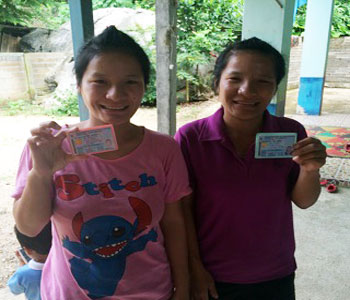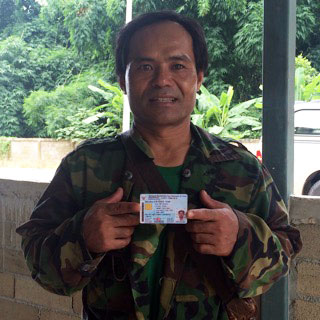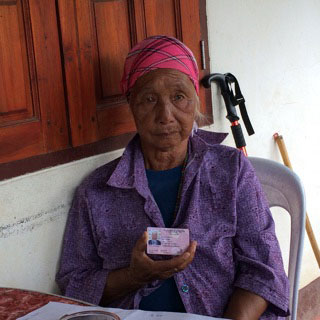A letter from Barry and Shelly Dawson serving as Regional Liaisons for Southeast Asia, based in Thailand
October 2016
Write to Barry Dawson
Write to Shelly Dawson
Individuals: Give to E200493 for Barry and Shelly Dawson’s sending and support
Congregations: Give to D507570 for Barry and Shelly Dawson’s sending and support
Churches are asked to send donations through your congregation’s normal receiving site (this is usually your presbytery).
Dear Friends and Mission Support Team
A little more than 20 years ago twin daughters were born into a modest family that lived outside the city of Chiang Rai. Even though those twin sisters, named Ratchani and Ratchanu, were born within the borders of Thailand, they were not immediately deemed to be citizens of the nation where their tiny lungs drew their first breaths of life. In fact, that coveted citizenship mantle would not be bestowed upon them until many years later. The reason for the long delay centers on the fact that their family’s ethnic identity is Akha, one of the many so-called “hill tribes” that inhabit the region of northern Thailand as well as parts of the neighboring nations of Laos, Myanmar, and the southern tier of China.
For hundreds of years various ethnic minority groups have lived in rather self-contained communities marked by the distinctive characteristics of their respective cultures, including language, social customs, unique clothing, spiritual beliefs, and varying degrees of openness or resistance to integration within the dominant cultural norms of Thailand. Among the hill tribe groups that continue to live in northern Thailand today are the Akha, Lahu, Lisu, Karen, Hmong, and Yao. While growing their crops on rugged hillside terrain, they scrape together subsistence farming livelihoods. Yet, with relatively poor soil quality in the more mountainous landscapes, some hill tribes historically have been more migratory as they searched for more fertile fields. Such migration tendencies, as well as undeniably ingrained cultural biases against ethnic minority groups, help to explain why some people born in Thailand—like twin sisters Ratchani and Ratchanu—have had to wait for years as they walk the road to citizenship.
The Road to Freedom
During a recent visit to northern Thailand we had the joy of meeting with several ethnic minority persons who have walked the road to citizenship. When we engaged in a translator-facilitated conversation with Ratchani and Ratchanu about their journey to citizenship, we learned that the process had taken between seven and eight years to complete. In fact, it was less than one year ago that those native-born twins finally received their Thai citizenship ID cards. We asked them to describe what it meant for them to receive their citizenship status in Thailand, and one of them quickly replied, “It means freedom.” Freedom to move to different places throughout the nation. Freedom to work openly. Freedom to vote in elections. Freedom to have medical treatment with more support for the costs of the clinic services. Freedom not to be constantly worried about random stops and searches by police. Freedom to travel through highway security checkpoints without feeling the internal pressure to pay bribes to officers for their safe passage. To those two young women from the Akha hill tribe their Thai citizenship ID cards are shining symbols of their “freedom.”
Walking in Solidarity on the Road to Freedom
Ratchani, Ratchanu, and so many other ethnic minority persons throughout the highlands of northern Thailand have not achieved their citizenship by themselves or with the help of only their families. The government’s legal process for obtaining citizenship is long and arduous. The regulations seem to change more often than the seasons. So each aspiring citizen candidate needs an advocate who possesses up-to-date knowledge of the relevant Thai laws, financial resources, and a persistent, passionate desire to be supportive throughout the protracted legal process. During the past few years the Social Development and Services Unit (SDSU) of the Church of Christ in Thailand (CCT) has been such an active advocate by focusing significant time, resources, and energy on assisting more than 400 hill tribe members obtain their citizenship papers. Moreover, an additional reason that the CCT has been emphasizing this ministry of advocacy and accompaniment is because the strategy is designed to help reduce both poverty and human trafficking in the region.
Yet, while the strategic mission initiative of the SDSU is obviously important for setting the goals and providing some of the resources for ethnic minorities to obtain their Thai citizenship, it is the faithful, unwavering efforts of people at the local, grass-roots level that make the dream of citizenship become a reality. One such local change agent is Pastor Wanchana, who leads a CCT congregation on the outskirts of Chiang Rai. Our first impression of Pastor Wanchana was that of a humble servant who, underneath his quiet and composed exterior, has a strong, surging river of faith with a relentless drive to do the work of Christ. We learned that 14 years ago the pastor started his congregation with only 3 members, yet today 107 Christians call his congregation their spiritual home.
Pastor Wanchana brings that same consistent passion to his ministry of helping ethnic minorities attain their Thai citizenship in spite of the challenges that confront him in his advocacy work. He revealed to us that because some authorities view him as a volunteer who has no official status as an advocate for persons seeking citizenship, he sometimes encounters stiff obstacles. He quietly shared, “At times I pray to the Lord, asking God to help me find another way to be accepted by the authorities, so that I can be allowed to help people receive the gift of citizenship.”
Undoubtedly, those prayers are being answered, since his efforts have resulted in 15 people receiving their citizenship papers in the past two years. When we asked him how much time he spends each week on the citizenship advocacy work, he could not quantify his time investment. However, his wife casually admitted that every day he is working on behalf of people who are seeking citizenship. She summed up his deep dedication by saying: “Sometimes late at night he is still working to help others get their citizenship. So when the light is on I need to move to another part of the house.”
We give thanks to God for the selfless sacrifices of Pastor Wanchana as well as other pastors and local church leaders in the Church of Christ in Thailand who are working tirelessly to assist hill tribe people in northern Thailand in their quest to reach the joy and the justice of citizenship. We invite you to pray for the Akha, Lahu, and other ethnic minority people who are now on the road to freedom.
Our Gratitude and an Invitation to Partner with Us
We are deeply grateful to everyone who has supported us throughout 2016 with your prayers, financial gifts, and messages of encouragement. Your expressions of partnership in our mission work in Southeast Asia are truly a blessing. In the coming new year of 2017 we invite you to continue your generous support, and even to prayerfully consider increasing your level of giving. As we look forward to celebrating the birth of Jesus, the Prince of Peace, we pray that you will experience the Savior’s joy and hope at Christmas and in all the seasons of your life.
With the Love of Christ,
Barry and Shelly
![]() You may freely reuse and distribute this article in its entirety for non-commercial purposes in any medium. Please include author attribution, photography credits, and a link to the original article. This work is licensed under a Creative Commons Attribution-NonCommercial-NoDeratives 4.0 International License.
You may freely reuse and distribute this article in its entirety for non-commercial purposes in any medium. Please include author attribution, photography credits, and a link to the original article. This work is licensed under a Creative Commons Attribution-NonCommercial-NoDeratives 4.0 International License.


